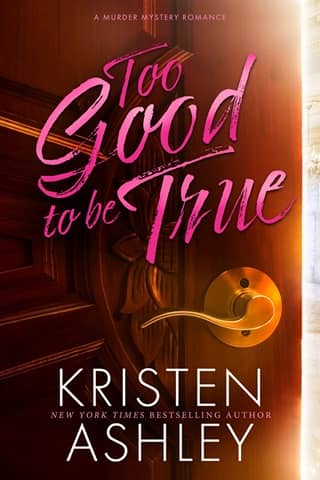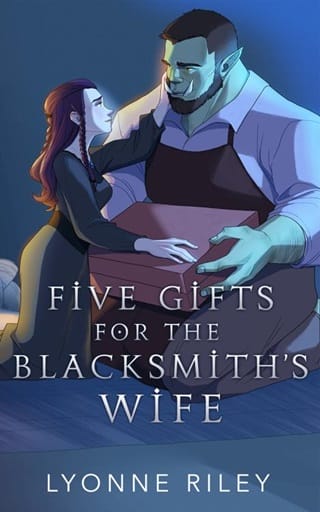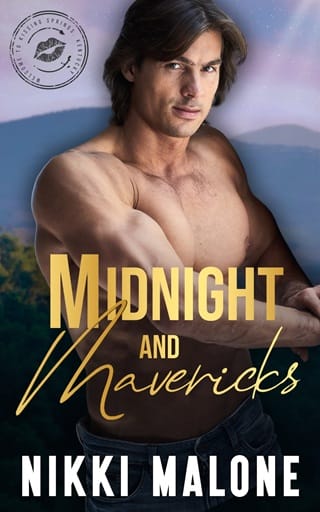Chapter 1
One
DUNCROFT
“This makes me nervous,” Lou declared.
I didn’t know how to reply because I found what she said odd.
Though, thinking about it, perhaps not too odd.
Portia wasn’t Lou’s biggest fan, she hadn’t been since the very beginning. Even I was surprised my little sister asked Lou to spend this week in the country at the family home of Portia’s boyfriend.
Me? Yes.
The older sister. The only sibling. It made sense.
Portia and I had our times of strife (a lot of them), but like she always had her father’s devotion, she always wanted her big sister’s approval.
When Lou came along, she took some of the former, which was why Portia had never accepted Lou as part of our family. Dad had spoiled Portia, and when he took some attention from his youngest in order to shower Lou with his brand of love, Portia wasn’t happy.
As for my approval, it wasn’t often forthcoming, mainly because Portia didn’t often make decisions I approved of.
I wasn’t the stuffy older sister.
Portia was the mischievous younger one.
According to me.
Also according to me, that description was being nice.
In other words, Portia could often be a pain in my ass.
Lou’s invitation to this week in the countryside? The much-younger third wife of our now deceased father? A wife Portia had butted heads with for the last decade?
That made no sense at all.
Due to this, Lou feeling nervous wasn’t odd…as such.
However, she’d been a member of our family for a long time. She’d sat vigil at Dad’s deathbed right alongside Portia and me. And Portia knew I wouldn’t be thrilled if she cut Lou out of something as important as a meet-the-family with a man who Portia had been seeing for some months now, her longest-ever boyfriend.
So, Lou’s assertion was also odd.
I glanced from navigating the narrow, winding road edged in thick hedgerows to the passenger seat where Lou was sitting, and I saw she wasn’t just nervous. And it was important to note, former supermodel Louella Fernsby-Ryan didn’t often get nervous, or if she did, she knew how to hide it.
No, now she looked—there was no other way to put it—terrified.
Any normal person might be, considering all we were heading into.
That said, Lou wasn’t a normal person. She’d been hobnobbing with the rich and famous for the last twenty plus years. She was beautiful. She was confident. She’d been incredibly successful in her chosen career.
But we were to spend the next ten days at Duncroft House, the country seat of the Alcotts. That being Earl Alcott, Richard, his wife, the Countess, Jane, and Daniel, their youngest son, Portia’s new beau.
Then there was Ian, their oldest, the heir to the title, who Portia told me promised to make several appearances that week, but she and Daniel were hoping he’d spend the whole week and make it a real family affair.
Yes.
And then there was Ian Alcott.
Hmm.
These folks were old-school aristocracy, and unlike many of their ilk who had lost no status but a lot of capital and assets across the centuries, they were old-school, big-time money.
New American big-time money didn’t rub against old aristocratic money very well. It never had. And I had quite a bit of experience knowing that our progressive age hadn’t changed that.
This all didn’t include Duncroft House itself.
A well-known jewel in England’s heritage crown. Perhaps not Buckingham, Windsor, Sandringham or Kensington caliber, but not far off.
It was supposed to be extraordinary.
And it had a notorious past.
“It’s going to be okay,” I told Lou.
“I don’t think so,” she mumbled to the window.
“Portia’s grown up a lot since Dad died,” I pointed out.
“Mm,” Lou hummed noncommittally. As she would.
Yes, Portia had matured.
This might have had something to do with the fact that Lou and I both managed her trust. Although Portia had (even I had to admit) an insulting monthly allowance of two thousand pounds neither Lou nor I could touch, the rest of her substantial inheritance was doled out at our discretion.
Though, that discretion had instruction from Dad, and if Portia didn’t stay gainfully employed, she didn’t get a penny above that two grand until she managed that feat. Further, if Portia remained in a job for less than twelve months, there were strict limits set on what money was forthcoming, again, until she’d accomplished what Dad demanded. Last, if Portia got into trouble with the police, with drugs or alcohol, or with unsavory characters or dubious projects, that money was frozen.
And if this behavior didn’t cease by the time Portia hit age thirty-five, Lou’s and my trusts were each augmented by half of Portia’s, and she received no more. Not even the two thousand.
However, if she managed to keep her shit together for five straight years, the entire trust would be at her disposal without oversight.
At first, Portia took this not as Dad intended, his way to prompt her to shape up, but instead as Dad’s beyond-the-grave assertion that he loved Lou more than her.
But recently, she’d been pulling herself together.
Portia getting it together was not due to efforts from Lou. Lou wanted Portia to like her, always had from the first time we met her (that included me, but I was less of a challenge). Now, Lou was the soft touch when Portia asked for money.
No. Portia was learning to toe the line due to me being o-v-e-r over her antics.
Dad had given her that two thousand so she wouldn’t starve because he knew I’d be a hard-ass.
And hard-ass I was.
So Portia finally seemed to be pulling it together.
And now there was Daniel Alcott.
“Have you met the Alcotts?” I asked Lou.
“I know Richard,” she said in a weirdly hesitant voice.
I glanced at her again. “Well?”
“Sorry?”
“Do you know him well?”
“Not really. Met in passing at a party or a dinner here or there.”
She said this, but it sounded like a question, like I could confirm she’d met Earl Alcott at a party or dinner here or there.
I didn’t inquire further about that.
“Not Jane?” I asked.
“No,” she murmured. “I’ve never met ‘The Countess.’”
Yes.
“The Countess,” capitalized and in quotes because this was how she was known in the media.
Jane Alcott was quite the mysterious character. Ethereally gorgeous, if the rare photo of her was anything to go by, and highly reclusive. Even when she was younger. Therefore, obviously, with beauty, a title and money, she was an object of fascination, which could explain why she was reclusive.
It was not the same with Richard. Or Daniel.
And definitely not Ian.
They weren’t reclusive, and as for the two sons, they didn’t shy away from the media at all.
I couldn’t say Ian sought it like Daniel seemed to, but it sure sought Ian.
“Have you heard about the house?” I went on, hoping to shake her out of her mood.
“Everyone’s heard about the house,” she answered.
“What have you heard?”
“It’s haunted.” I knew she’d turned my way when she asked, “Have you heard that?”
“Yes,” I said. “People tend to die there.”
“It’s been around for hundreds of years,” she reminded me. “There was a fortress there during William the Conqueror’s time, so a dwelling has been there for over a millennium. It’s bound to have had a death or two.”
A death or two?
“When Portia told us things were serious with Daniel and asked us to this week at Duncroft, I looked it up,” I informed her. “Some pretender to the throne was tortured and killed in the castle that sat there in the thirteenth century. The torture was medieval, Lou, literally and brutally. Then they threw him in a pit and starved him to death. Apparently, the new house is built over that pit, and his bones are still there.”
“Why a week?”
From the subject I was talking about, I was confused by her question. “Pardon?”
“Why not invite us for a weekend? Or if she wanted more time for us to get to know Daniel and his family, a long weekend? Or, really, starting off with us all going to dinner in London? That would be easier for everybody. Why are we here from Friday to the next Sunday? That’s a long time, it’s a lot to ask, it’s a lot of pressure for everyone, and it’s strange.”
“It’s Portia.”
I heard Lou sigh.
Yes. The time suck. The drama.
All Portia.
“Then there was that earl’s daughter in the fifteenth century who wasn’t thrilled with the man her father chose for her to marry,” I continued with my theme to take us from Portia’s larks, which I found annoying and Lou had a lot more patience for, but they had to wear thin for her too. “So, on the eve of her wedding, she poisoned her fiancé, and not to leave them out, also poisoned her father, her mother and her husband-to-be’s father and mother. Not exactly the Red Wedding, but the story goes that the poison she chose made them expel everything from blood and bile to unmentionables from both ends until they died. I’d call that worse than the Red Wedding…by a lot.”
“It’s pretty gross,” Lou agreed.
“There was also that countess and her lover. I forget his name.”
“Cuthbert.”
I nearly smiled. Of course she knew about the fortress, the castle and Cuthbert. She’d looked it up too.
“Cuthbert,” I repeated. “Found in flagrante delicto with the countess by the earl. They were quite into what they were doing, didn’t know he’d come upon them. He had time to get hold of a dagger, and then he gutted old Cuthbert in his cuckold’s bed while his wife watched in horror, before he turned the dagger on her.”
“Poor Cuthbert.”
“And poor Lady Joan,” I added. “Her blood pooled with Cuthbert’s as she bled to death beside him in that bed.”
“Yes,” Lou replied. “Poor Lady Joan.”
“Four people have hung themselves in that house,” I carried on. “At least two have died in duels in the forest surrounding it, though there could be more. After that practice was outlawed, it still went on. And then there’s what happened to Dorothy Clifton in the twenties.”
Lore had it that Duncroft was possessed of more than one ghost.
Dorothy Clifton, it was said, was the angriest spirit of the lot.
I could tell Lou was warming to my theme when she spoke.
Then again, I suspected she would. She was always trying to get me to cuddle up with popcorn and ice cream and watch things like Get Out and The Shining and It. She loved that kind of thing.
I hated it. That would be hated it, with a passion.
It took a while for me to love her, but eventually I did. I wasn’t as ugly about it in the beginning as Portia, but Dad marrying someone I could be friends with in the manner we were actually contemporaries was not fun.
Then we became friends, and things changed.
“What I don’t understand is, why the secrecy?” she asked. “From what I know, never, not once have they opened the house to the public. By invitation only. And those invitations have been scarce. Every generation, rabid privacy. It’s really unusual in a heritage home in England like Duncroft.”
“I know, right?”
“It’s like they’re hiding something.”
It totally was.
“I guess we’re going to find out,” she noted. “Ten days there, plenty of time to see a ghost.”
“Yes,” I replied. “Plenty of time. Plenty of time to uncover secrets too.”
“Yes,” she whispered, again sounding off, and I almost didn’t hear it when she finished, “Secrets.”
I didn’t push further on that either, though I thought it was weird, regardless of the fact I knew Lou had secrets.
We all did.
I didn’t dig for hers, mostly so she would return the favor.
As for what we were soon to face, I’d caved in watching Get Out and The Shining, because they were classics and I liked films. And I would admit I thought they were both really good. I put my foot down on such as It and The Ring (and others).
But I wasn’t concerned about Duncroft’s supposed ghosts because I didn’t believe in ghosts.
I was an avid member of the National Trust. I’d been in many a manor and castle in that country (and others). The mustiness. The draftiness. The dank darkness or shadowed corners or secret passageways. I could absolutely see how people could convince themselves they’d experienced a haunting.
But that didn’t make it real.
No, I was more worried about the patrician Richard. The withdrawn Jane. The ne’er-do-well Daniel.
The womanizer Ian.
And secrets.
Theirs.
And ours.
Yes, I was more concerned about the Alcotts than about their supposedly haunted country seat.
Them and us…we were not a good mix.
Dad had moved Portia and me to England twenty years ago. Although I went home frequently for visitations with Mom—and so Portia could have some sort of mother figure, I talked Dad into letting her go with me—for all intents and purposes, we’d never left.
We were still proud Americans and the beneficiaries of massive inheritances of new money. My mother, Dad’s first castoff, had been and still was a schoolteacher. Portia’s mother, castoff two, had been an incorrigible gold digger.
And then there was Lou, who was only five years older than me.
This sojourn felt more like Lou and I had been called in as reinforcements for a week in the English countryside at the very famous home of a very wealthy and illustrious family.
But nevertheless, we were still outnumbered.
And if you believed in that kind of thing, outclassed.
In other words, I was feeling some anxiety too.
It didn’t help that we’d left the motorway forty-five minutes ago. We’d then turned off the A road twenty minutes ago, and not onto a B road, but a coiling, thin ribbon of C road. We hadn’t passed a town or village in miles. And according to the satnav, we had another twenty-six minutes on this lane, twisting through…nothing.
This was a long way from anything—and call me a city girl (which I was)—I didn’t like it.
Lou grew quiet along with me.
And we both (for my part, since I was driving, it was intermittently) watched the arrow on the satnav glide along the snaking road as we kept track of the countdown to arrival.
It was 2:37 and we were to arrive at 3:03.
We broke out of the hedgerows at 2:55 and into rolling countryside covered in green, with vast splotches of purple heather and jutting masts of gray, lichen-covered rocks punctuated here and there by an irregular tree malformed by wind.
Add some mist and I wouldn’t have been surprised to see a frock-coated Heathcliff brooding astride his horse in the distance.
At 3:00, the moor gave way to a more cultivated and arboreal landscape.
At 3:02, Duncroft House became visible.
And…wow.
Okay.
Maybe Buckingham and Windsor were the biggest, shiniest jewels in England’s crown.
But in my opinion, Duncroft shone brightly as jewel number three.
It was beautiful.
It was huge.
It was sprawling.
And it was overpowering.
“Right. Now I’m nervous,” I admitted.
Lou reached out and squeezed my knee.
I drove my Mercedes between the tall, black, elaborate iron gates accented copiously by gold and attached on either side to a ten-foot-tall wall made of thick Yorkstone.
We’d officially arrived at Duncroft.
And I wasn’t feeling sterling thoughts.
Because the second we drove through those gates, a shiver slithered down my spine.
 Fullepub
Fullepub 



